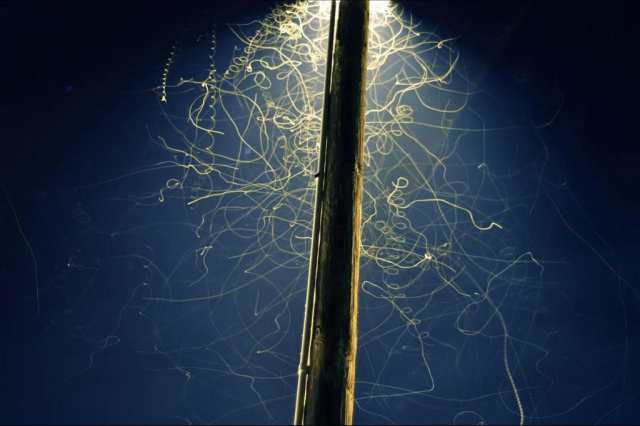飛んで火に入る夏の虫
(Tonde hi ni iru natsu no mushi; “A summer bug that flies into a flame”)
Definition:
Continuing forward even though doing so means rushing, or at least preceding, headlong into danger. Recklessly inviting danger. “Like a moth to a flame,” except instead of a moth specifically it’s a “summer insect.”
Breakdown:
The structure on this one might be a little tricky – it’s two verb phrases describing a noun phrase. The first verb phrases consists solely of the verb 飛ぶ (tobu), “to fly,” in conjunctive form. The second has the verb 入る (iru), “enter,” in prenominal form, connected by the directional particle に (ni) to the noun 火 (hi), “flame.” The noun phrase that does the flying and the entering is 虫 (mushi), “insect” or “critter” (the character is used for everything from true insects to spiders to snakes), although in this case likely the various flies and bugs that breed in the summer and swarm around lights at night. This detail is provided by using the associative particle の (no) to connect 虫 to 夏 (natsu), “summer.”
Notes:
Reading 入る as hairu, in accordance with modern grammar, is considered an error. This saying comes to us from an eleven-hundred-year-old poetic anthology called the Kokin wakashuu (古今和歌集).
Example sentence:
先生の表情が次第に険しくなっていくのに気づかず、飛んで火に入る夏の虫のように喋り続ける隅田君であった。
(“Sensei no hyoujou ga shidai ni kewashiku natte iku no ni kidzukazu, tonde hi ni iru natsu no mushi no you ni shaberi tsudzukeru Sumida-kun de atta.”)
[“And there was Sumida, charging into the lion’s den, talking and talking without noticing that the teacher’s expression was growing ever more fearsome.”]

- More





